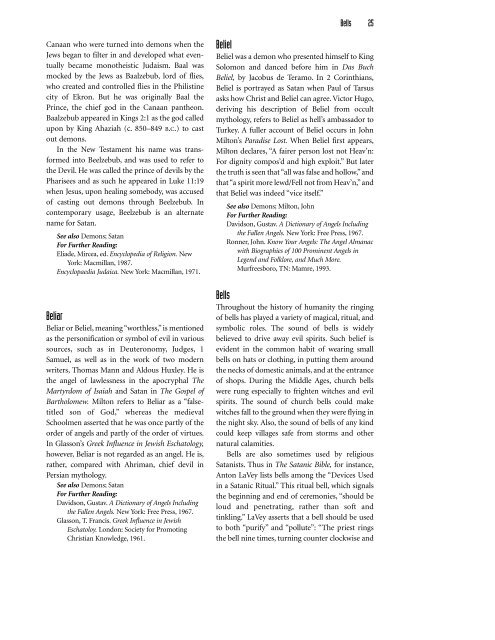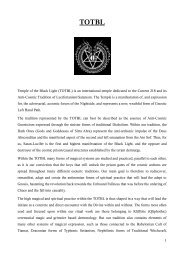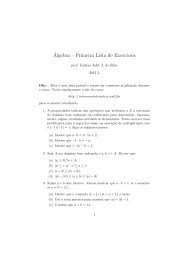Satanism Today - An Encyclopedia of Religion, Folklore and Popular ...
Satanism Today - An Encyclopedia of Religion, Folklore and Popular ...
Satanism Today - An Encyclopedia of Religion, Folklore and Popular ...
Create successful ePaper yourself
Turn your PDF publications into a flip-book with our unique Google optimized e-Paper software.
Bells 25<br />
Canaan who were turned into demons when the<br />
Jews began to filter in <strong>and</strong> developed what eventually<br />
became monotheistic Judaism. Baal was<br />
mocked by the Jews as Baalzebub, lord <strong>of</strong> flies,<br />
who created <strong>and</strong> controlled flies in the Philistine<br />
city <strong>of</strong> Ekron. But he was originally Baal the<br />
Prince, the chief god in the Canaan pantheon.<br />
Baalzebub appeared in Kings 2:1 as the god called<br />
upon by King Ahaziah (c. 850–849 B.C.) to cast<br />
out demons.<br />
In the New Testament his name was transformed<br />
into Beelzebub, <strong>and</strong> was used to refer to<br />
the Devil. He was called the prince <strong>of</strong> devils by the<br />
Pharisees <strong>and</strong> as such he appeared in Luke 11:19<br />
when Jesus, upon healing somebody, was accused<br />
<strong>of</strong> casting out demons through Beelzebub. In<br />
contemporary usage, Beelzebub is an alternate<br />
name for Satan.<br />
See also Demons; Satan<br />
For Further Reading:<br />
Eliade, Mircea, ed. <strong>Encyclopedia</strong> <strong>of</strong> <strong>Religion</strong>. New<br />
York: Macmillan, 1987.<br />
Encyclopaedia Judaica. New York: Macmillan, 1971.<br />
Beliar<br />
Beliar or Beliel, meaning “worthless,” is mentioned<br />
as the personification or symbol <strong>of</strong> evil in various<br />
sources, such as in Deuteronomy, Judges, 1<br />
Samuel, as well as in the work <strong>of</strong> two modern<br />
writers, Thomas Mann <strong>and</strong> Aldous Huxley. He is<br />
the angel <strong>of</strong> lawlessness in the apocryphal The<br />
Martyrdom <strong>of</strong> Isaiah <strong>and</strong> Satan in The Gospel <strong>of</strong><br />
Bartholomew. Milton refers to Beliar as a “falsetitled<br />
son <strong>of</strong> God,” whereas the medieval<br />
Schoolmen asserted that he was once partly <strong>of</strong> the<br />
order <strong>of</strong> angels <strong>and</strong> partly <strong>of</strong> the order <strong>of</strong> virtues.<br />
In Glasson’s Greek Influence in Jewish Eschatology,<br />
however, Beliar is not regarded as an angel. He is,<br />
rather, compared with Ahriman, chief devil in<br />
Persian mythology.<br />
See also Demons; Satan<br />
For Further Reading:<br />
Davidson, Gustav. A Dictionary <strong>of</strong> <strong>An</strong>gels Including<br />
the Fallen <strong>An</strong>gels. New York: Free Press, 1967.<br />
Glasson, T. Francis. Greek Influence in Jewish<br />
Eschatoloy. London: Society for Promoting<br />
Christian Knowledge, 1961.<br />
Beliel<br />
Beliel was a demon who presented himself to King<br />
Solomon <strong>and</strong> danced before him in Das Buch<br />
Beliel, by Jacobus de Teramo. In 2 Corinthians,<br />
Beliel is portrayed as Satan when Paul <strong>of</strong> Tarsus<br />
asks how Christ <strong>and</strong> Beliel can agree. Victor Hugo,<br />
deriving his description <strong>of</strong> Beliel from occult<br />
mythology, refers to Beliel as hell’s ambassador to<br />
Turkey. A fuller account <strong>of</strong> Beliel occurs in John<br />
Milton’s Paradise Lost. When Beliel first appears,<br />
Milton declares, “A fairer person lost not Heav’n:<br />
For dignity compos’d <strong>and</strong> high exploit.” But later<br />
the truth is seen that “all was false <strong>and</strong> hollow,” <strong>and</strong><br />
that “a spirit more lewd/Fell not from Heav’n,” <strong>and</strong><br />
that Beliel was indeed “vice itself.”<br />
See also Demons; Milton, John<br />
For Further Reading:<br />
Davidson, Gustav. A Dictionary <strong>of</strong> <strong>An</strong>gels Including<br />
the Fallen <strong>An</strong>gels. New York: Free Press, 1967.<br />
Ronner, John. Know Your <strong>An</strong>gels: The <strong>An</strong>gel Almanac<br />
with Biographies <strong>of</strong> 100 Prominent <strong>An</strong>gels in<br />
Legend <strong>and</strong> <strong>Folklore</strong>, <strong>and</strong> Much More.<br />
Murfreesboro, TN: Mamre, 1993.<br />
Bells<br />
Throughout the history <strong>of</strong> humanity the ringing<br />
<strong>of</strong> bells has played a variety <strong>of</strong> magical, ritual, <strong>and</strong><br />
symbolic roles. The sound <strong>of</strong> bells is widely<br />
believed to drive away evil spirits. Such belief is<br />
evident in the common habit <strong>of</strong> wearing small<br />
bells on hats or clothing, in putting them around<br />
the necks <strong>of</strong> domestic animals, <strong>and</strong> at the entrance<br />
<strong>of</strong> shops. During the Middle Ages, church bells<br />
were rung especially to frighten witches <strong>and</strong> evil<br />
spirits. The sound <strong>of</strong> church bells could make<br />
witches fall to the ground when they were flying in<br />
the night sky. Also, the sound <strong>of</strong> bells <strong>of</strong> any kind<br />
could keep villages safe from storms <strong>and</strong> other<br />
natural calamities.<br />
Bells are also sometimes used by religious<br />
Satanists. Thus in The Satanic Bible, for instance,<br />
<strong>An</strong>ton LaVey lists bells among the “Devices Used<br />
in a Satanic Ritual.” This ritual bell, which signals<br />
the beginning <strong>and</strong> end <strong>of</strong> ceremonies, “should be<br />
loud <strong>and</strong> penetrating, rather than s<strong>of</strong>t <strong>and</strong><br />
tinkling.” LaVey asserts that a bell should be used<br />
to both “purify” <strong>and</strong> “pollute”: “The priest rings<br />
the bell nine times, turning counter clockwise <strong>and</strong>
















